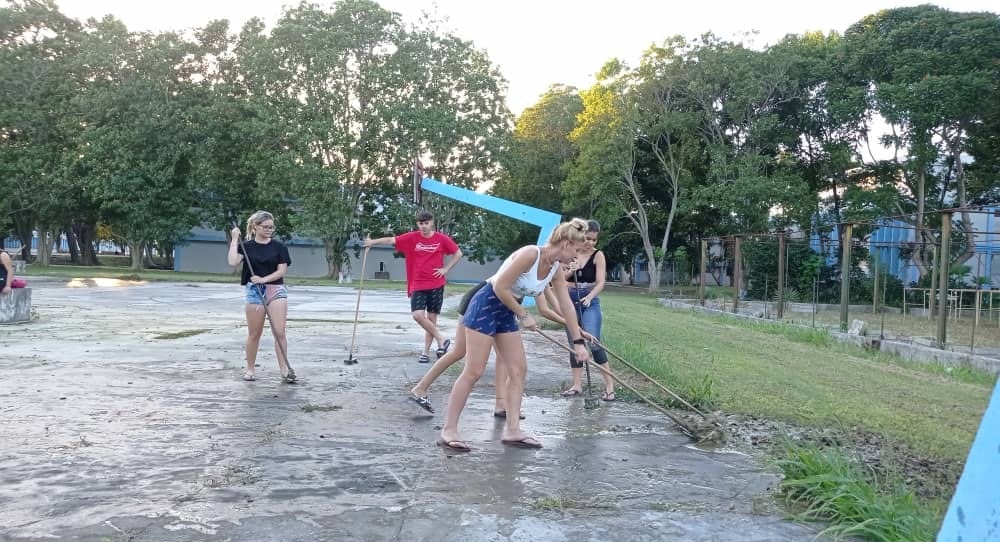Dozens of students in the Department of Agronomy at the Camilo Cienfuegos campus of the Universidad de Matanzas have dropped out due to the precarious conditions that prevail at that institution of higher learning.
DIARIO DE CUBA spoke with Bryan Michel Fajardo Borges, a second-year Agricultural Engineering student who is considering the possibility of joining those who have abandoned their studies. "My plans are to try to finish the semester by passing the classes that I must so that I don't have to drop out. This semester, due to the issue of transportation, and various situations, the schedule has been tighter, and I've missed a lot. This means that I don't attend face-to-face classes, which affects me a lot, since I learn better by listening to lectures than by reading a 20-page PDF document," the 21-year-old explained.
At the end of September, the Universidad de Matanzas suspended in-person activities for at least a week due to an energy shortage that the Cuban regime called a "contingency." The solution, to continue with the curriculum, was to "ensure online guidance during this period".
This was not the first time that the students at the institution had their classes interrupted. Since the pause generated by the pandemic, energy problems on the island have repeatedly interrupted educational processes. Now, for example, the program continues for university students at Matanzas University, who are supposed to go to school for a week and then study for two at home. Professors take advantage of the week that students spend at the university to give them exams.
Fajardo has found it difficult to study for so long at home. Transportation challenges are another issue that worries him, as it is very expensive to get around. "My father is the one who supports me financially because my mother's salary isn't enough, and, being in college, I don't have time to work. If I drop out of college I would mainly do what I did when I was on summer vacation: going door to door and selling through the different buying and selling groups on Telegram. In the month and a half that I was doing that, I made good money," said Fajardo, who lives in the municipality of Colón.
This young man told DIARIO DE CUBA that 103 students started the current academic year, but there are only 40 left now. "That's the other thing influencing my desire to leave school. I had friends there that I'd known since high school, and also new friendships that, for many of these reasons, have left school," the young man explained.
"In the end, supposing I graduate, what kind of future would this country offer me? Most professionals are working freelance, because you can't get by on a salary," Fajardo concluded.
DDC contacted another young Colombian who has already abandoned his Agronomy studies. He is one of those 63 students who were in Fajardo's group. "The main reason I dropped out was because of the parole (humanitarian, to go to the US), because I'm on it and I'm going to leave the country. I don't have to go through so much work with the transportation and food if I go before I graduate. What happens to many people at the University of Matanzas is that the issue of transportation is a problem. For example, when I left I had to rent a motorbike because the buses from Varadero no longer enter the city. In the week I spent more than 2,000 pesos just renting motorbikes," explained the former student, on condition of anonymity.
At the Camilo Cienfuegos campus of the University of Matanzas there are also problems with the water supply at the dorms. "Right now, in front of Building D (one of the housing buildings) there has been a major leak for months, and you couldn't even play on the basketball court because it was flooded. In addition, the water turbine there always burns out," added the young man, who left school two weeks ago.
Food is another factor that complicates life for Matanzas university students on scholarships. "As for the food, the truth is that it's very bad," the former student continued. Some days they just give you rice and beans. One day they gave us just rice and eggplant. The food is so bad that you have to go shopping. The pizzas, for example, cost 100 pesos. There are those who can afford to buy them every day, but there are those who are going hungry. "
"Another disappointment," the young man added, "is the shortage of professors; the other day I went to a class and no one could even understand the professor. She taught the class with a phone in her hand because she didn't know anything. You asked her something, and her answer had nothing to do with it. She usually taught a different subject, but they had put her there due to the lack of professors, who they have running around. From that day on, I was completely disillusioned with the situation."
This young man now works with his father in the field: "I'm helping him because he is alone there on the farm. But my plans are the same as everyone else's: to leave the country with the parole when I can, because this is a disaster."
DIARIO DE CUBA called the educational secretariat and vice-rector's office of the University of Matanzas to investigate this situation. None of these entities offered any information. DDC could not verify that the school dropout phenomenon has expanded to other fields of study, but, due to the circumstances, it is unlikely that it is confined to Agricultural Engineering.
